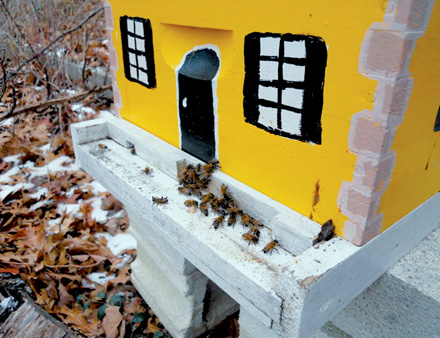Borrowing Honeybees

Periodically I am asked to either bring my honeybee hives to someone’s property or to find beekeepers who would be willing to bring their hives to pollinate – blueberry, elderberry or whatever crops – for free. In a couple of emails, the property owners wanted to charge beekeepers rent to bring the hives to their land.
First, beekeepers have invested tens of thousands of dollars in equipment, bees, education and time by the point they have sustainable bee colonies. Yes, beekeeping is expensive, even if you build your own hives and catch swarms.
Secondly, beekeepers that do provide pollination services charge for those services, sometimes a monthly fee or a charge per crop being pollinated. Most crops that require pollination have short windows where they need pollination services, which is why major beekeeping companies spend 6 months moving colonies all around the country.
In addition to the stress of moving, honeybees can get exposed to chemicals applied within a five-mile radius of where hives are located. There is no antidote to pesticide exposure. The beekeeper takes that risk when they move a colony into a new area, not the property owner.
That’s not to say there aren’t beekeepers who would be willing to bring hives onto someone’s property but the property has to have excellent bee foraging plants to make it worthwhile, and those lands are few and far between. Most Missouri land has been overgrazed and over-farmed so unless the property owner is working to restore the soil conditions and planting crops to provide a continuous flower source through the growing season, most property doesn’t provide bees with nutritious pollen.
In some areas, like St. Louis, there are now “Adopt a Hive” programs where beekeepers either bring in a hive to someone’s property for a fee, and then provide some honey at the end of the season provided there is extra honey. There are some issues with this program because some of the hives are not properly maintained, bees disappear and property owners end up without honey. It’s not uncommon for a colony not to have extra honey after the first year but non-beekeepers still expect to get honey out of a hive.
The best arrangement is one where the property owner and beekeeper split the cost of the hives and bees. The beekeeper sets up the hives on the property, then at the end of the season the property owner and the beekeeper work together to extract and split the honey. If the arrangement works well, the bees can overwinter on the property until the following year.
So would I bring my hives to someone’s property? Sorry no, I like having my girls close by where I can keep an eye on them. I started keeping bees for pollination myself and I enjoy seeing my bees visiting my flowers throughout the season. It also gives me a great excuse to keep planting and developing my one-acre hillside garden, not that I need another reason to buy flowers on sale.
Charlotte Ekker Wiggins is a beekeeper, gardener and sometimes cook. Published by El Dorado Springs Sun once in print and online with author’s permission. Copyright 2017, all rights reserved. This column may not be reprinted, republished or otherwise distributed without author’s permission. Contact Charlotte at gardeningcharlotte at gmail dot com.

HOME BEES – One of my honeybee hives in summer on my hillside garden. I like to keep them close so I can enjoy watching them. (Photo by Charlotte Ekker Wiggins).



Facebook Comments